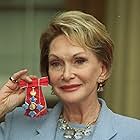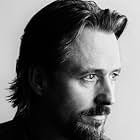IMDb RATING
6.5/10
574
YOUR RATING
Mohawk archaeologist Baptiste Asigny engages in a search for his ancestors following a tragic terrain slump in the Percival Molson Stadium.Mohawk archaeologist Baptiste Asigny engages in a search for his ancestors following a tragic terrain slump in the Percival Molson Stadium.Mohawk archaeologist Baptiste Asigny engages in a search for his ancestors following a tragic terrain slump in the Percival Molson Stadium.
- Awards
- 10 wins & 12 nominations total
- Director
- Writer
- All cast & crew
- Production, box office & more at IMDbPro
Storyline
Did you know
- TriviaWithout the casting crews knowledge, one of the prophets (George Gilbert) was actually related to his in-film descendant (played by Hogan Gilbert). The connection was only made on set when Hogan saw a photo of who his "ancestor" was cast as and realized it looked like his actual grandfather.
Featured review
In this movie's script, the Montreal writer's wish to connect with his city's history takes us on a first trip back in time to the 1200s; then the 1500s; the 1800s.
With each return to the present, we rejoin the Mohawk archaeologist and follow along in his quest to find physical evidence for the exact location, on the Island of Montreal, for the village called "Hochelaga".
In recorded history, we can read the words of Jacques Cartier, who describes his arrival in the village and his meeting with the Elders.
Each voyage back in time means entering drastically different moments in the history of the City of Montreal: in the 12002, Iroquoian is spoken; in the 1500s, French, Latin & Mohawk are spoken; in the 1800s, French, English & Mohawk are spoken; in present day, Mohawk, French & English are spoken. Of course, sub-titles help us along in the separating out, and weaving back together of events over an eight-century span of time, and the Mohawk archaeologist's need to reach back and make real his ancestors.
The year 2017 marked the 150th anniversary of the creation of (on July 1st 1867) of "The Dominion of Canada". Among others, one aboriginal filmmaker, Alethea Arnaquq-Baril (Angry Inuk / 2016), who is Inuit from Nunavut in northern Canada, called for Canadians to see why she would add two zeros to 150 years. In the months leading up to the July 1st celebration, the Inuit, Innu, First Nations and Métis peoples expressed how overlooked they felt, saying that the July 1st date, significant to European settlers, ignores the virtual wiping out of a multitude of peoples living here for centuries before the arrival of Jacques Cartier.
Today, I entered the packed 350-seat theater, where most in attendance were over the age of 35. I could have heard a pin drop during the movie. As it concluded, a single person way down in front began to clap. A moment later others joined in. About 70% of those in attendance began to clap as well. I sat, quiet, just taking it all in. "It" being a collective experience, a collective moment, a collective happening.
As I slowly walked back to my car, I thought: _ for all the talk we heard, back in July 2017, from those who say that Canada was born in 1867, what I experienced in a movie theater today tells me, that collectively, we all know otherwise.
With each return to the present, we rejoin the Mohawk archaeologist and follow along in his quest to find physical evidence for the exact location, on the Island of Montreal, for the village called "Hochelaga".
In recorded history, we can read the words of Jacques Cartier, who describes his arrival in the village and his meeting with the Elders.
Each voyage back in time means entering drastically different moments in the history of the City of Montreal: in the 12002, Iroquoian is spoken; in the 1500s, French, Latin & Mohawk are spoken; in the 1800s, French, English & Mohawk are spoken; in present day, Mohawk, French & English are spoken. Of course, sub-titles help us along in the separating out, and weaving back together of events over an eight-century span of time, and the Mohawk archaeologist's need to reach back and make real his ancestors.
The year 2017 marked the 150th anniversary of the creation of (on July 1st 1867) of "The Dominion of Canada". Among others, one aboriginal filmmaker, Alethea Arnaquq-Baril (Angry Inuk / 2016), who is Inuit from Nunavut in northern Canada, called for Canadians to see why she would add two zeros to 150 years. In the months leading up to the July 1st celebration, the Inuit, Innu, First Nations and Métis peoples expressed how overlooked they felt, saying that the July 1st date, significant to European settlers, ignores the virtual wiping out of a multitude of peoples living here for centuries before the arrival of Jacques Cartier.
Today, I entered the packed 350-seat theater, where most in attendance were over the age of 35. I could have heard a pin drop during the movie. As it concluded, a single person way down in front began to clap. A moment later others joined in. About 70% of those in attendance began to clap as well. I sat, quiet, just taking it all in. "It" being a collective experience, a collective moment, a collective happening.
As I slowly walked back to my car, I thought: _ for all the talk we heard, back in July 2017, from those who say that Canada was born in 1867, what I experienced in a movie theater today tells me, that collectively, we all know otherwise.
- How long is Hochelaga, Land of Souls?Powered by Alexa
Details
- Release date
- Country of origin
- Official site
- Languages
- Also known as
- Хочелага, земля душ
- Filming locations
- Production company
- See more company credits at IMDbPro
Box office
- Budget
- CA$15,100,000 (estimated)
- Gross worldwide
- $7,262
- Runtime1 hour 40 minutes
- Color
- Aspect ratio
- 2.39 : 1
Contribute to this page
Suggest an edit or add missing content

Top Gap
By what name was Hochelaga, Land of Souls (2017) officially released in India in English?
Answer





























